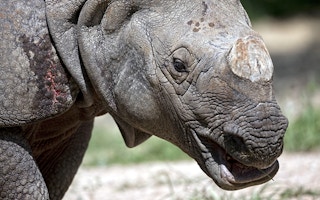Today, the world celebrates the first ever World Wildlife Day. Here in America, the bald eagle, the grizzly bear, the salmon and the American bison are distinct examples of the centrality of wildlife to our folklore, our history and our shared national heritage. These beloved creatures and countless other wildlife species are reason for us to take pause today — and everyday — to appreciate nature’s blessings. Thanks to the concerted efforts of conservationists and lawmakers over the years, and the continuing enforcement of wildlife laws in the United States, we can still celebrate these iconic symbols of America.
But many other species, both here at home and around the globe, face critical challenges. Sophisticated, organized criminal rings are decimating majestic animals such as the African elephant, rhinos, and dozens of other species. Just last year, poachers slaughtered an estimated 35,000 African elephants, amounting to over 95 elephants killed per day. The brutality doesn’t end there; it also takes a great toll on human life. Poachers have murdered scores of park rangers who got in the way of coveted elephant tusks. They take away livelihoods of families and communities who depend on tourism revenues.
The illicit trade in wildlife trafficking — from tiger skins to illegally harvested fish — generates an ugly profit of more than $19 billion per year, which is a conservative estimate. Rhino horn, in fact, is worth more than gold or cocaine, and can fetch $30,000 per pound on the black market. And demand for elephant ivory is increasing in market around the world.
“
Rhino horn, in fact, is worth more than gold or cocaine, and can fetch $30,000 per pound on the black market. And demand for elephant ivory is increasing in market around the world
The market for ivory carvings, rhino horn, shark fin delicacies, tiger pelt decorations, and the like is fueling an underground, illegal economy that creates new market opportunities and revenue sources for transnational criminal networks. The high-profit, low-risk nature of the crime continues to draw in even more nefarious criminal elements, including some groups with links to terrorism and rogue military personnel. Wildlife trafficking is undermining the rule of law throughout the supply chain — from breeding official corruption on the ranges, at ports, and in courts, to driving away honest park rangers and local communities who fear for their lives. And wildlife crime is quickly decimating iconic species, whose disappearance — a looming and real risk — would strike to the core for all the people of the world.
We must act now. Last month, the President announced his National Strategy for Combating Wildlife Trafficking. Our three co-chairing agencies — the Departments of State, Justice and Interior — are leading the President’s whole-of-government fight against wildlife trafficking by pursuing a three-pronged strategy: strengthening domestic and global enforcement; reducing demand for illegally traded wildlife at home and abroad; and strengthening partnerships internationally and domestically with local communities, NGOs, private industry and others to combat wildlife poaching and illegal trade.
Strong enforcement is critical to stopping those who kill and traffic in protected wildlife. The United States takes wildlife trafficking crimes very seriously, and we have had significant successes over the years in prosecuting those who smuggle and traffic in elephant ivory, rhino horns, South African leopard, Asian and African tortoises and reptiles, and many other protected species. The Strategy will enhance enforcement efforts here in the United States as well as the work we do to help our foreign partners develop their capacity to adopt and effectively enforce laws that will stop poachers and wildlife traffickers.
Striking a blow against the demand that fuels the illicit trade is another cornerstone of the Strategy. A key element of achieving that objective was the President’s announcement of a near ban on commercial trade of elephant ivory — a prohibition of imports, exports and domestic sale of ivory, with a very limited number of exceptions. We expect the US market for commercially traded elephant ivory to dry up once the ban is in place and previous loopholes closed.
The ban builds on an increasing global awareness about the need to take on the wildlife traffickers. Last November, the United States destroyed six tons of confiscated ivory in a demonstration of our commitment to fight this crime and its devastating implications. We are not alone in the fight. Kenya, Gabon, The Philippines, China, France and, most recently, Chad, destroyed their own confiscated ivory, and Hong Kong has announced their intention to follow suit. These efforts are raising the issue’s profile at home and abroad.
You can do your part too. Do not buy suspicious goods. Do not buy ivory — even small trinkets or jewelry. Turn down the offer to buy that tiger skin rug. Reject the shark fin soup. Do not purchase that pair of python skin boots or that exotic pet. Do not be fooled by the false medical sales pitch about rhino horn. Many wildlife products — from sea turtle bracelets to beluga sturgeon caviar to rosewood guitars — may be protected under international and domestic law. Always be an informed consumer and make sure that your purchases are legal and won’t be harmful to wildlife populations. And tell your friends and family to do the same.
World Wildlife Day will happen once a year. But we, as policy makers and as individuals who care deeply about wildlife, call upon you to join your government, your friends, your neighbors, and your communities in this fight daily. Together, we can address this serious threat to global security and save these iconic species. We can make a difference for ourselves, and for generations to come.
John Kerry is the United States Secretary of State. Eric H. Holder, Jr. is the US Attorney General, and Sally Jewell is the Secretary of the Interior. This post originally appeared in the Huffington Post.

















